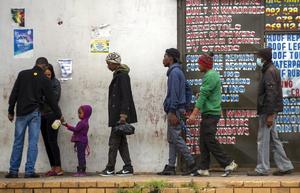 People queue for shopping at a local supermarket in Duduza, east of Johannesburg, South Africa, Thursday, April 2, 2020. South Africa went into a nationwide lockdown for 21 days in an effort to mitigate the spread to the coronavirus. The new coronavirus causes mild or moderate symptoms for most people, but for some, especially older adults and people with existing health problems, it can cause more severe illness or death. (PHOTO / AP)
People queue for shopping at a local supermarket in Duduza, east of Johannesburg, South Africa, Thursday, April 2, 2020. South Africa went into a nationwide lockdown for 21 days in an effort to mitigate the spread to the coronavirus. The new coronavirus causes mild or moderate symptoms for most people, but for some, especially older adults and people with existing health problems, it can cause more severe illness or death. (PHOTO / AP)
The United Nations agencies in West and Central Africa are bolstering collaboration with communities, using lessons from their Ebola experience to respond to the novel coronavirus pandemic.
They said the pandemic could have a different face in the region compared to the rest of the world and therefore requires a specific response.
The UN agencies emphasized the need to contextualize and tailor response strategies, given the challenges faced in the region with regard to cross-border movements, youthful populations, malnutrition, malaria, and displacement among others
The UN agencies emphasized the need to contextualize and tailor response strategies, given the challenges faced in the region with regard to cross-border movements, youthful populations, malnutrition, malaria, and displacement among others.
They stressed the need for a coordinated response including in the mid-and long-term, while flagging other immediate secondary impacts that goes beyond the health sector.
Among the issues flagged were the lack of education, high HIV prevalence, large numbers of displaced people and refugees, limited access to water and sanitation particularly for people living in overcrowded peri-urban areas and slums.
Mabingue Ngom, the acting chairman of the Regional Directors Group of UN agencies, called for effective and swift interventions, using a community-based approach to overcome coronavirus in West and Central Africa, a region particularly vulnerable to the pandemic.
So far, the disease has infected 1,103 and killed 29 in West Africa and infected 409 and killed 26 in Central Africa.
In West and Central Africa, Sierra Leone is the only remaining country without any confirmed cases.
READ MORE: Africa urged to prepare for outbreak
Among the countries with the highest number of cases are Burkina Faso with 282 infections, Senegal with 190, and Cameroon with 233, all of which have now entered the stage of local transmission.
Humanitarian plan
The UN agencies initiative followed the launch of the US$2.5 billion global humanitarian plan against the pandemic on March 25 by Antonio Guterres, the UN secretary-general. The money is aimed at financing the fight in the world's most vulnerable countries, most of which are in Africa.
The humanitarian plan will deliver essential laboratory equipment to test for the virus, and medical supplies to treat people; install hand-washing stations in camps and settlements and launch public information campaigns on how to protect oneself and others from the virus.
ALSO READ: S. Africa economy silence contrasts with drastic virus steps
Ngom welcomed the launch of the global appeal and called for closer attention to be paid to countries and communities facing humanitarian crises, coupled with weak health systems, as well as other challenges such as discrimination.
Dorian Job, the West Africa program manager for Doctors Without Borders, said the Ebola epidemic that affected West Africa between 2014 and 2016 possibly has helped countries in the region to be better prepared.
Job said based on the Ebola experience, priority must be maintained in ensuring the safety of health workers; maintaining confidence in the epidemic response and the actors implementing it, to avoid panic, and ensuring the dissemination of correct information.
"We will have to take stock of the past as well as innovate. I would not be surprised if new solutions for responding to this coronavirus epidemic come from the African continent. Indeed, African countries have more experience in managing health emergencies, and public health reflexes are more developed here than in Europe," Job said.


